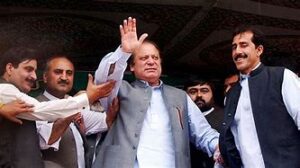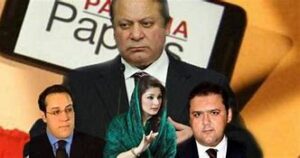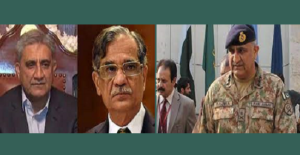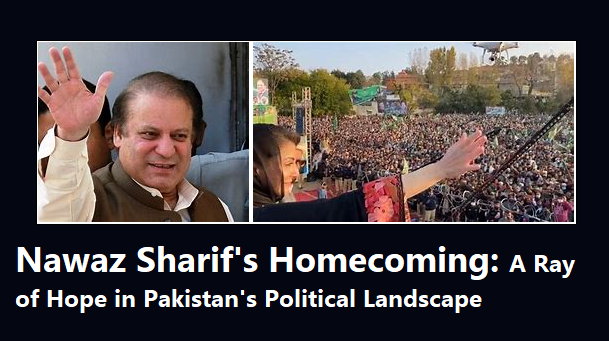Nawaz Sharif’s Rockstar Welcome:
The anticipation is palpable in Pakistan as supporters prepare to welcome Nawaz Sharif, the three-time former Prime Minister, back to his homeland after nearly four years in London. Sharif’s expected return, scheduled for October 21st, is seen as a pivotal moment, with his supporters viewing him as a potential savior who can lead the nation out of its economic and political crises. In this blog, we delve into the fervor surrounding his return, the challenges he faces, and the implications for Pakistan’s political landscape.
Mian Muhammad Nawaz Sharif is indeed a prominent Pakistani politician with a long and complex political career. Born on December 25, 1949, in Lahore, Pakistan, he is a member of the Sharif political dynasty. He has many ups and downs in his political journey, and the controversies that have marked, his three non-consecutive terms as Prime Minister.

As the date of his arrival approaches, streets in Pakistan’s Punjab province are adorned with life-sized posters of Nawaz Sharif. Rallies and gatherings are being organized, with the Pakistan Muslim League – Nawaz (PML-N) planning to host a massive gathering of 1 million people at Lahore’s historic Iqbal Park. For his supporters, Sharif is more than a political leader; he represents hope in troubled times.
The Crises Sharif Must Confront:
Sharif’s return comes at a critical juncture for Pakistan, facing multiple challenges. The economy has been faltering, and the cost of living crisis has worsened, leading the country to the brink of default before securing an IMF bailout. A recent World Bank report revealed a significant increase in the number of Pakistanis living below the poverty line, highlighting the urgent need for economic stability and reform.

Political analysts suggest that Sharif’s return won’t be a “walk in the park.” The PML-N, like many other political parties, is struggling to find a narrative to build its election campaign upon. In contrast, Imran Khan’s Pakistan Tehreek-e-Insaf (PTI), though facing its own challenges, has a more established base of support. Sharif’s years in exile might have disconnected him from the changing political dynamics on the ground.
Sharif’s Accountability Demand:
Nawaz Sharif has made bold statements demanding accountability from key figures, including former Chief Justice Saqib Nisar, ex-army chief Gen. Qamar Javed Bajwa, and other military officials, whom he accuses of being responsible for his ouster in 2017. These calls for accountability are central to his narrative, but they also stir controversy and raise concerns about the potential for further polarization in Pakistan’s already complex political landscape.

The Establishment’s Dilemma:
One intriguing aspect of Sharif’s return is the perception of his relationship with the Pakistani military establishment. While some see a friendly liaison, political analysts suggest that Sharif may not be entirely on the same page with the establishment, even if his party might be. This dissonance raises questions about the political landscape and the power dynamics at play.
The establishment itself appears to be grappling with limited options. Imran Khan’s confrontation with the establishment led to his ouster, leaving a void in the political scene. Sharif’s return offers an alternative that the establishment might be willing to explore, albeit with caution. This leaves Pakistan in a delicate balance, with Sharif and his party aiming to capitalize on this opportunity.
Conclusion:
Nawaz Sharif’s impending return to Pakistan has set the stage for a high-stakes political showdown. His supporters believe he can lead the nation out of its economic and political woes, but the challenges he faces are significant. The call for accountability and the establishment’s role add layers of complexity to this situation. As Pakistan navigates these turbulent waters, it remains to be seen whether Nawaz Sharif can indeed be the beacon of hope the nation so desperately seeks.
For more related news – https://universenews.co.in/category/politics/
